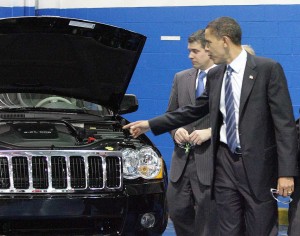
While President Obama might be looking at a Chrysler, a new study says the majority of Americans are steering clear of the troubled automaker -- and rival GM.
Talk of bankruptcy could prove a self-fulfilling prophecy for General Motors and Chrysler, warns a new study of consumer attitudes toward the troubled Detroit manufacturers.
Senior GM officials have oft claimed there’s a “wellspring of support” for their company, among American motorists. If so, the well is rapidly running dry, according to research by California-based AutoPacific Inc. A study conducted immediately after President Barack Obama rejected the two makers’ request for more federal aid found that a majority of potential customers are now concerned about buying GM and Chrysler products. Even traditional GM customers are far less inclined to purchase one of the maker’s vehicles in the wake of the latest news.
The AutoPacific survey of 700 Americans found only a slight three percent of respondents unaware that GM and Chrysler are surviving on federal assistance. And nearly nine out of 10 knew that the president had rejected the companies’ bid for billions more in federal loans.
 “This survey highlights how very aware the general public is of the current condition of the American automobile industry, and their hesitation about buying a car at this time,” said George C. Peterson, president, AutoPacific, who conducted the survey. “It indicates that car companies will continue to struggle with sales for sometime to come.”
“This survey highlights how very aware the general public is of the current condition of the American automobile industry, and their hesitation about buying a car at this time,” said George C. Peterson, president, AutoPacific, who conducted the survey. “It indicates that car companies will continue to struggle with sales for sometime to come.”
That’s particularly true, if the survey is accurate, for GM and Chrysler. Nearly two-thirds of respondents expressed concern about buying a Chrysler, at this time, with 52 percent giving a similar response about GM products. And the president’s rejection of new loans made even normally-loyal General Motors customers three times more likely to steer clear of the company’s line-up.
On the other hand, only 15 percent of respondents expressed concerns about buying a product from Ford – the only maker not seeking a federal bailout. In fact, 72 percent said they’re now more likely to purchase a vehicle from the second-largest of the domestic makers.
Asked why they’d steer clear of GM or Chrysler, one respondent answered that, “To take a chance on a car made by unhappy workers is not a good idea in the best of times. To buy a car and then have the company restructure and lose dealerships, parts or warranty…is not worth the risk of my money.”
The survey results pose a paradox for both GM and Chrysler: a full seven in ten said the companies should reorganize under bankruptcy protection. But 45 percent would not buy a vehicle from a bankrupt automaker.
The survey results underscore recent industry sales results, which should GM and Chrysler posting monthly declines that have, at times topped 50 percent, compared to year-earlier levels.
“The reservations shown in this survey about buying from a company in bankruptcy illustrate the need to expedite any bankruptcy proceedings in order to get buyers back into dealerships,” added Peterson.
